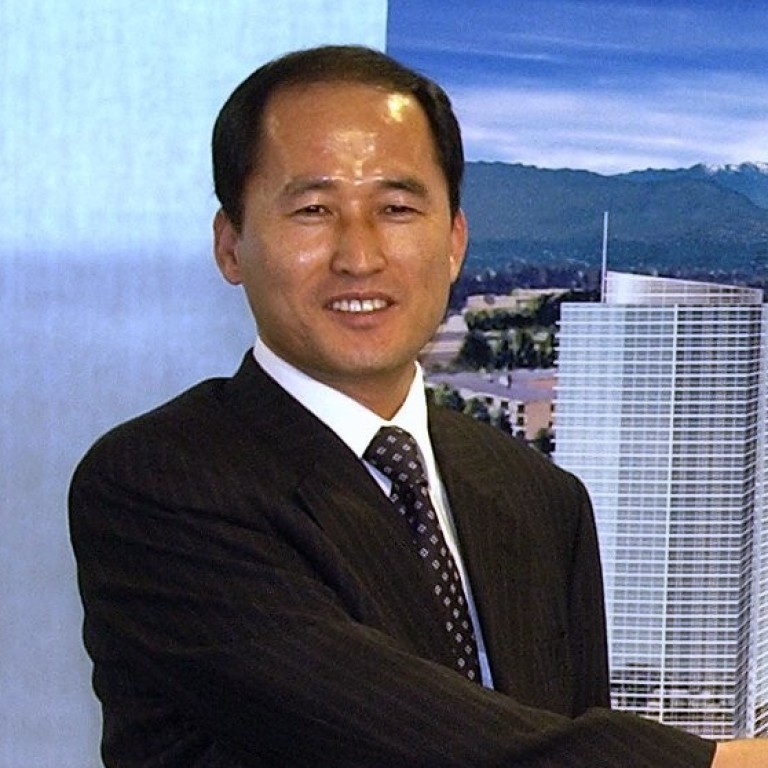
South Korean tycoon, wanted on multimillion-dollar fraud charges, loses 10-year Canadian extradition fight
- Former Vancouver developer Jung Myung-soo was led away in handcuffs, but his lawyer says he intends to appeal
- The case played out in the same Vancouver courts where Meng Wanzhou fought against extradition to the US, with some of the same lawyers involved
A South Korean tycoon who was behind one of Metro Vancouver’s biggest property developments has lost a long court battle against extradition to his native country, where he faces multimillion-dollar fraud charges.
Jung Myung-soo was led away in handcuffs on Thursday after a judge in the Supreme Court of British Columbia ordered him committed for extradition. Canada’s justice minister will make the final decision whether to surrender him to Korean prosecutors.
However, Jung’s lawyer Tony Paisana said his client would appeal, and a hearing was scheduled for later in the day for Jung to reapply for bail.
Jung’s case has been quietly playing out for years in the same Vancouver courtrooms where the extradition battle of Huawei Technologies executive Meng Wanzhou had been receiving worldwide attention.
The cases even involved some of the same lawyers, including Paisana, who helped represent Meng, and Canadian Department of Justice lawyer Diba Majzub, who helped represent the interests of the US in Meng’s case and South Korea in Jung’s.
Meng’s case ended last month when she reached an agreement with US authorities that effectively halted her prosecution and aborted the extradition case after almost three years.

Jung’s extradition battle, which has been going on since 2011, centres on two sets of offences said to have occurred between 2005 and 2007, involving investments or loans totalling about C$7 million (US$5.6 million) that were received by Jung from his alleged victims, identified as Mr Gwan and Mr J. Kim.
But the money, which was mostly intended for use in Jung’s developments in the Vancouver satellite city of Surrey, as well as a project in Korea, was allegedly misused and misdirected by the developer.
In 2005, Jung’s Central City development, involving five skyscrapers and 1,400 residential units, was hailed as a transformative project for Surrey by mayor Doug McCallum. But Jung’s firm filed for bankruptcy protection in 2008 and the project was eventually taken over by Concord Pacific and completed under a rebranding as Park Place.
In my view, the record clearly provides sufficient evidence upon which a reasonable jury, properly instructed, could return a verdict [of] guilty of fraud
In his ruling, Justice David Crossin said Jung had fled Korea via Japan in 2008 after allegedly making written confessions to his conduct.
“In my view, the record clearly provides sufficient evidence upon which a reasonable jury, properly instructed, could return a verdict [of] guilty of fraud,” said Crossin, referring to both the Gwan and Kim cases. “This is not contested by Mr Jung.”
However, the question was whether Jung could be extradited on both sets of charges.
Jung was not resisting extradition on the alleged Gwan offences, Crossin said. But he was seeking to have extradition on the Kim charges thrown out, claiming the ministerial authority to proceed with the matter was improper, because it said Jung was wanted for trial – in fact, Jung claimed, he had already completed his trial in Korea for the Kim matter and was instead wanted for sentencing.
But Crossin rejected the argument and ordered Jung’s committal on both sets of charges.
South Korean tycoon’s Canadian extradition fight over fraud claims is revealed
Regarding the Kim case, “the record does not contain a direct or express declaration of the fact that a guilty plea has been entered or a finding of guilt pronounced, nor a conviction entered upon the indictment”, said Crossin.
In the absence of certainty, the minister could therefore have come to either conclusion about whether Jung had already been convicted or not when he granted the authority to proceed; it was not up to the court to speculate about the minister’s reasoning either way.
“Korea sought extradition for prosecution and sentencing. It was for the minister to choose to seek extradition for prosecution only … It was clearly available on the evidence for the minister to describe Mr Jung as someone sought for prosecution in relation to allegations,” said Crossin.
Jung cannot be extradited for at least another 30 days, irrespective of his pending appeal.
He had been viewed as a key player in the development of Surrey in the mid-2000s via the Central City project, which was described at the time as the biggest retail-residential project in Surrey’s history.
In a 2005 profile in BC Business magazine, Jung was said to have moved from Seoul to West Vancouver the previous July to further his children’s education.
“I thought first about education, and then about business, second,” he was quoted as saying, adding that he planned to spend 80 per cent of his time in Canada.
The profile said that in addition to his Canadian operation, he ran development companies in South Korea, China, Uzbekistan, Ukraine and Russia.

